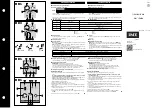
⎯
9
⎯
6 F 2 S 0 8 4 6
1. Introduction
GRZ100 is a fully numeric distance protection for application to transmission lines on solidly
earthed network.
The GRZ100 provides the following protection schemes.
- Time-stepped distance protection with four forward zones, three reverse zones, and one
non-directional zone
- Zone 1 extension protection
- Command protection (Distance protection using telecommunication)
- Overcurrent backup protection
- Thermal overload protection
- Switch-on-to-fault and stub protection
- Circuit breaker failure protection
- Broken conductor detection
- Out-of-step protection
- Overvoltage and undervoltage protection
For high-resistance earth faults, the GRZ100 provides the following directional earth fault
protections.
- Directional earth fault protection
- Directional earth fault protection utilizing telecommunications facilities
The GRZ100 actuates high-speed single-shot autoreclose or multi-shot autoreclose.
The GRZ100 provides the following metering and recording functions.
- Metering
- Fault record
- Event record
- Fault location
- Disturbance record
The GRZ100 provides the following menu-driven human interfaces for relay setting or viewing of
stored data.
- Relay front panel; LCD, LED display and operation keys
- Local PC
- Remote PC
Password protection is provided to change settings. Eight active setting groups are provided. This
allows the user to set one group for normal operating conditions while other groups may be set to
cover alternative operating conditions.
GRZ100 provides either two or three serial ports, and an IRIG-B port for an external clock
connection. A local PC can be connected via the RS232C port on the front panel of the relay.
Summary of Contents for GRZ100 B Series
Page 264: ... 263 6 F 2 S 0 8 4 6 Appendix A Block Diagram ...
Page 271: ... 270 6 F 2 S 0 8 4 6 ...
Page 272: ... 271 6 F 2 S 0 8 4 6 Appendix B Signal List ...
Page 307: ... 306 6 F 2 S 0 8 4 6 ...
Page 308: ... 307 6 F 2 S 0 8 4 6 Appendix C Variable Timer List ...
Page 310: ... 309 6 F 2 S 0 8 4 6 Appendix D Binary Input Output Default Setting List ...
Page 321: ... 320 6 F 2 S 0 8 4 6 ...
Page 322: ... 321 6 F 2 S 0 8 4 6 Appendix E Details of Relay Menu and LCD Button Operation ...
Page 331: ... 330 6 F 2 S 0 8 4 6 ...
Page 340: ... 339 6 F 2 S 0 8 4 6 Appendix G Typical External Connections ...
Page 377: ... 376 6 F 2 S 0 8 4 6 ...
Page 384: ... 383 6 F 2 S 0 8 4 6 Appendix J Return Repair Form ...
Page 388: ... 387 6 F 2 S 0 8 4 6 Customer Name Company Name Address Telephone No Facsimile No Signature ...
Page 389: ... 388 6 F 2 S 0 8 4 6 ...
Page 390: ... 389 6 F 2 S 0 8 4 6 Appendix K Technical Data ...
Page 401: ... 400 6 F 2 S 0 8 4 6 ...
Page 402: ... 401 6 F 2 S 0 8 4 6 Appendix L Symbols Used in Scheme Logic ...
Page 405: ... 404 6 F 2 S 0 8 4 6 ...
Page 406: ... 405 6 F 2 S 0 8 4 6 Appendix M Example of Setting Calculation ...
Page 417: ... 416 6 F 2 S 0 8 4 6 ...
Page 418: ... 417 6 F 2 S 0 8 4 6 Appendix N IEC60870 5 103 Interoperability and Troubleshooting ...
Page 434: ... 433 6 F 2 S 0 8 4 6 Appendix P Inverse Time Characteristics ...
Page 437: ... 436 6 F 2 S 0 8 4 6 ...
Page 438: ... 437 6 F 2 S 0 8 4 6 Appendix Q Failed Module Tracing and Replacement ...
Page 444: ... 443 6 F 2 S 0 8 4 6 Appendix R Ordering ...
Page 447: ......







































